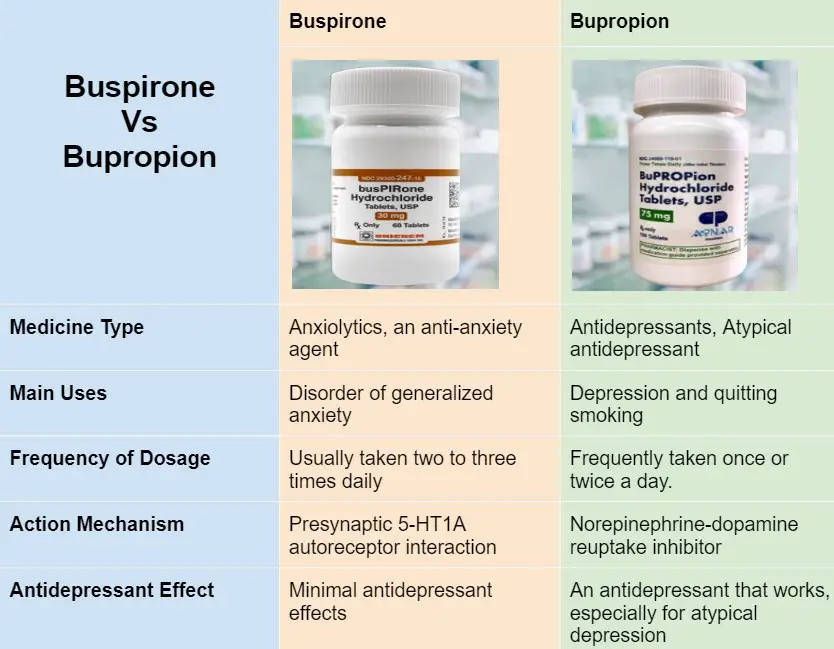Buspirone Vs Bupropion: Key Differences & Similarities

Mental health is an integral part of our existence, and it determines how productively we function in our daily life. The quality of life can be drastically hampered by our mental state. When someone struggles with mental health problems like; anxiety or major depressive disorder, they look for medication that will ease their mental state.
So are you trying to figure out which one is better for you, Buspirone Vs Bupropion?
Both Buspirone and Bupropion are two different medications and they have distinct mechanisms of action and indications. Buspirone is primarily used for treating anxiety disorders. On the other hand, Bupropion is used as an antidepressant. That said, both have proven trial records in treating anxiety disorders and major depressive disorders, respectively.
Here, we will elaborate on details about Buspirone (Buspar) and Bupropion, such as key differences in how they work, potential side effects, and their effect on pregnancy. Keep reading and decide for yourself which medicine suits your needs. But don’t just start taking medicine without Doctor’s consultation.
Buspirone Vs Bupropion: The Key Differences
Doctors currently prescribe these two medicines to treat mental health problems like anxiety and depression. Their similar names can confuse our readers. So, here we highlight the key differences between these two medicines to make it easier for you to understand.
What Is Buspirone?
Buspirone or Buspar belongs to the anxiolytics drug class. It functions by changing the concentrations of specific organic compounds in the brain. Buspirone treats anxiety disorders or relieves anxiety symptoms in the short term. Buspirone raises dopamine and serotonin levels to lessen anxiety symptoms.
What Is Bupropion?
Bupropion is part of the antidepressants medicine group. Bupropion acts in the brain to treat Major Depressive Disorder, Seasonal Affective Disorder, and smoking cessation. Bupropion or Wellbutrin works by simultaneously inhibiting norepinephrine and dopamine reuptake. This process ensures a unique method of antidepressant activity.
| Key Differences | Buspirone | Bupropion |
| Medicine Type | Anxiolytics, an anti-anxiety agent | Antidepressants, Atypical antidepressant |
| Main Uses | Disorder of generalized anxiety | Depression and quitting smoking |
| Action Mechanism | Presynaptic 5-HT1A autoreceptor interaction | Norepinephrine-dopamine reuptake inhibitor |
| Effect on Anxiolysis | Effective for certain anxiety symptoms and generalized anxiety disorder | It is mostly used for depression and is less helpful for generalized anxiety. |
| Antidepressant Effect | Minimal antidepressant effects | An antidepressant that works, especially for atypical depression |
| Smoking Cessation | Not recommended for quitting smoking | Endorsed as a tool to help smokers quit smoking |
| Continuity Risk | Low possibility of dependency or withdrawal signs | Low potential for addiction; typically regarded as non-addictive |
| Interaction | Moderate interactions with several other medications, especially MAOIs, and SSRIs | Harmful medication interactions with TCAs. Antipsychotics such as clozapine (Clozaril) |
| Pregnancy Safety | Use only if needed | There are some risk factors |
| Frequency of Dosage | Usually taken two to three times daily | Frequently taken once or twice a day. |
What Conditions Do Buspirone and Bupropion Treat?
The main condition that buspirone is used to treat is generalized anxiety disorder (GAD). It is an anxiolytic, which means that it helps lessen tension- and anxiety-related emotions. Chronically excessive and unmanageable concern over many different elements of life is an indication of GAD.
Buspirone’s effects are more gradual and may take several weeks before the full therapeutic benefits become apparent. Therefore, you will be disappointed if you consider it as a quick relief from anxiety or panic attacks.
Doctors don’t prescribe Buspirone as a first-line therapy for social anxiety or particular phobia because it’s not that effective for treating these disorders.
As you are interested to know about Buspirone, you must have heard about the major depressive disorder. It’s a disease where the patient feels a persistent feeling of sorrow. This disease can also show symptoms like losing interest in daily life activities, changes in sleep patterns and food habits, and trouble focusing on anything.
Bupropion is licensed for therapy for seasonal affective disorder. It’s a kind of depression that often manifests in the fall and winter when there is less natural sunshine. This medicine assists people in quitting smoking. It makes it simpler for people to stop smoking by lowering nicotine cravings and withdrawal symptoms.
Bupropion may occasionally be administered off-label to treat ADHD symptoms, especially in adults.
Buspirone Vs Bupropion: Are The Number of Doses Equal?
Their names could be similar, but doses are not at all similar. We have provided a list of doses for these two medicines, but we don’t recommend self-treatment. Kindly consult a doctor and only take these medicines if your doctor prescribes them.
Buspirone Oral Doses for Adults
The recommended dosage of buspirone for adults is shown in the following table.
| Condition | Recommended Doses | Maximum Doses Per Day |
| Generalized Anxiety Disorder (Adults) | 7.5 mg twice a day | 60 mg |
Maintenance Dose: Up to 20 to 60 mg/day in split doses may be added to the daily dose in increments of 5 mg every two to three days.
Bupropion Oral Doses for Adults ( HYDROCHLORIDE)
Here is a chart of Bupropion standard adult dose for depression:
| Medication Type | Initial Dose | Maintenance Dose | Maximum Dose Per Day |
| Immediate-release tablets | 100 mg twice a day | 100 mg thrice a day | 450 mg (don’t exceed 150 mg per dose) |
| Sustained-release tablets | 150 mg in the morning (once a day) | 150 mg twice a day | 400 mg ( (don’t exceed 200 mg per dose) |
| Extended-release tablets | 150 mg in the morning (once a day) | 300 mg once a day | 450 mg |
| Extended-release tablets (Bupropion Hydrobromide) | 174 mg in the morning (once a day) | 348 mg once a day | 348 mg |
Buspirone Vs Bupropion: Drug Interactions
If you are taking multiple types of medicine, checking possible medication interaction details is essential to avoid fatal medicine interactions. Here you can check the list of medicine which can be deadly to take with Buspirone and bupropion.
Buspirone’s Interactions with Other Medicines
- The interaction between MAO inhibitors and Buspirone can be deadly. Avoid taking Buspirone if you have taken an MAO inhibitor in the last 14 days.
- Taking 1,2-Benzodiazepine and Buspirone increases the chance of CNS depression.
- Combining Buspirone with Abacavir can raise the level of serum.
- Abametapir can increase the serum concentration of Buspirone; it is better to avoid these two medicines together.
- Abatacept has the potential to increase Buspirone’s metabolism.
- Combining Buspirone and Aceclofenac can cause severe hypertension.
Buropion’s Interactions with Other Medicines
Bupropion generally interacts with these medicines. I have arranged this list according to their interaction’s fatality level:
Major Interaction:
- Abilify
- Adderall
- Adderall XR
- Cymbalta
- Lexapro
- Norco
- Prozac
- Vyvanse
- Zoloft
Moderate Interactions:
- Benadryl
- Metoprolol Succinate ER
- Metoprolol Tartrate
- ProAir HFA
- Xanax
- Zyrtec
Side Effects of Buspirone And Bupropion
As we all know, every medicine has the potential to cause some side effects. So, Buspirone and Bupropion are no different in this case. Here you will find some side effects of these two medicines and will be able to take safety measures if you intend to start taking them.
Buspironre’s Side Effects:
- You may feel lightheaded or dizzy while taking this medicine. You just need to be careful during your activity and don’t go driving if you are not in a state to do so.
- In case you are into alcohol, you will have to say no to any alcoholic beverages for the time period of taking Buspirone.
- Some people tend to abruptly stop a course of medicine without consulting their doctor. Well, it can be pretty risky if you just randomly stop taking this particular medicine we are talking about because it has a long list of withdrawal symptoms, such as nausea, dizziness, muscle cramp, disturbed sleeping patterns, increased anxiety, and confusion.
- It can cause uncontrollable shaking in your body.
- Blurred vision is another side effect of taking Buspirone.
- Heartbeat can be faster than usual.
- One may experience hives. Swelling of the face is another side effect that can be scary. You may notice swelling in the eyes, mouth, throat, tongue, or lips.
Bupropion’s Side Effects:
- After taking Bupropion, you can experience excessive sweating and disturbance in the regular thought pattern.
- A small percentage of patients can have rashes on their skin.
- Stomach and muscle pain are also rare side effects of Bupropion.
- Angle-closure glaucoma is another side effect you need to be aware of. This condition includes symptoms like vision change, swelling, and pain in the eye.
- Overdosing can cause serious side effects like seizures. If you have a history of seizures or any previous brain injury or disease, then share it with your doctor.
- Taking this medicine can worsen your condition if you already suffer from cardiovascular disease. Go for a detailed check-up before starting the course of medication.
Is It Safe to Take Buspirone and Bupropion in Pregnancy?
Studies conducted on animals show this medicine does not possess any potential threat to the baby in the mother’s womb.
Another research conducted on a small group of people demonstrates that taking this medicine while pregnant or at the age appropriate for childbearing didn’t harm the fetus. Having said that, there’s still room for research to find out more details on how this medicine can impact fetuses during pregnancy. So, it’s better not to take this while you are expecting a child unless it’s really an emergency.
The majority of the research claims that Bupropion doesn’t have an adverse effect on pregnancy. These studies also demonstrated that this medicine does not influence miscarriage, stillbirth, or the lower body weight of the child.
However, an alarming finding regarding women who had this medicine during their second trimester revealed that it increased the risk for the child to develop ADHD when they reach the age of five.
Some reported that they took Bupropion and stopped the course of medication by the end of their pregnancy period. In these cases, newborns had to experience some withdrawal symptoms.
As of now, the connection between Buspirone and Bupropion with pregnancy isn’t clear. So, if you can avoid taking these types of medicine during your pregnancy period, that would be best. You can take these medicines only if your doctor prescribes you after considering your overall condition.
FAQs
Does Buspirone Make You Happier?
Serotonin makes us feel lighter and happier. Buspirone connects to serotonin receptors and creates a peaceful experience. It is also known to cause you to experience soothing feelings.
Does Buspirone Increase Focus?
Yes, because this reduces anxiety and helps to gain clarity. When you feel less confused and relaxed, you can worry less and focus more on what’s important.
Can You Take Bupropion And Buspirone Together?
Buspirone and Bupropion don’t interact with each other adversely. However, these two medicines treat different types of mental illnesses. Only a licensed mental health practitioner can advise if you need to take them together.
Bottom Line
If you are here reading the bottom line, that means you already got the answer to your query regarding Buspirone vs Bupropion. When it comes to treating some mental illnesses, which have become a severe concern in today’s world, Buspirone and Bupropion have significantly helped their users to get better. You need to see a mental health practitioner to get your condition evaluated to get a tailored medication course.





